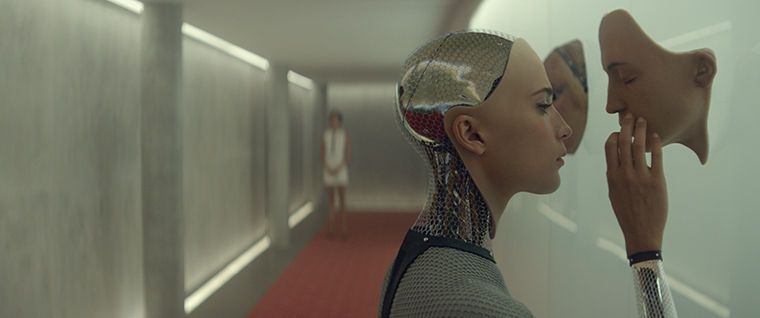‘Ex Machina’ a masterful sci-fi film experience
Oscar Isaac and Alicia Vikander star in “Ex Machina,” a film about a programmer who takes part in an experiment with a female robot who takes on human-like qualities.
April 27, 2015
“Ex Machina” is the story of an artificial intelligence named Eva played by Alicia Vikander (“A Royal Affair,” “Seventh Son”), who was built by young genius Nathan Bateman, played by Oscar Isaac (“Balibo”). Bateman, whose tech prodigy archetype has been seen many times before, is the CEO of search engine company Bluebook. One of his employees, Caleb, played by Domhnall Gleeson (“Unbroken”), is “randomly selected” to visit Bateman’s estate for one week. Caleb soon learns the real reason for visiting is to test Eva’s compatibility.
The simplicity of the film’s premise allows for the complex themes to grow. With one location and four characters—including Bateman’s silent servant Kyoko—the audience spends a significant amount of time focusing on the principal concepts.
The movie takes advantage of this format from the start. Upon Caleb’s arrival, Bateman tells him to move past the awkward working relationship. Bateman is asking the same of the audience: they should move past the need for exposition and get straight to the heart of the matter. There are no lofty explanations, just a setup and release.
Per Bateman’s instructions, Caleb performs the Turing Test on Eva, meaning if—despite him knowing otherwise—he believes her consciousness to be real, she passes the test. This reveals that a trick is being played, but it slowly becomes unclear on whom. The extremely rewarding element of this setup is that regardless of Caleb being fully aware of the objectives of the test, the wool is slowly pulled over his eyes. In a masterful execution, it becomes indiscernible who is lying, and the film’s dark psychological tone begins to unfold.
“Ex Machina” works fabulously in the science-fiction genre. The film is steeped heavily in the language of sci-fi, with references to Alan Turing and J. Robert Oppenheimer and everything in between. Visually, it is sleek and modern, with the technology of Bateman’s world stepping into every frame. It also features man’s intellect as both the protagonist and antagonist, with the power inspiring both awe and fear. “Ex Machina” also asks some poignant questions regarding the meta-cognition of artificial intelligence. Simply put, there are computers that function on a basic level, programmed for specific tasks that they complete. Then there are computers aware of their own cognition and consciousness. They can determine their own tasks and respond to surroundings, but they can also pass judgment, come to conclusions and even make jokes. They surpass human cognition in ability and awareness. There is a possible third option, a gray area, in which Eva lies.
In describing American painter Jackson Pollock’s work, Bateman says it is neither random nor planned, but somewhere in between. This is a perfect description of Eva’s capabilities. She is aware of her own consciousness, yet only within the confines of the information available to her. She exists within the confines of her structure but just outside of it. She is a product of her design, yet she defies it.
Despite its sci-fi focus, the film includes nature imagery. Bateman’s estate is in the middle of a gorgeous landscape, one that crowds the facility. The audience is frequently brought out of discussions on artificial intelligence and whirring motors and sleek white walls to be flown through ice caps and lush forests. It contrasts so perfectly that it’s beautifully refreshing.
Eva’s hands and face are synthetic skin that seem real, yet her torso is a glass window into the inner workings of her artificial body. Although her movement and performance feel human, her design is a constant reminder that she is not.
One of the rougher elements in the film is the dialogue, especially at the beginning. It feels so forced and contrived because of Gleeson’s performance—he’s clearly the weakest link. His lines are stuffy and pretentious. Isaac and Vikander are terrifically haunting and mesmerizing.
“Ex Machina” is a gorgeous look into the psyche of man and machines. It is a dark psychological thriller that plays with the audience in just the right ways. Not all of its elements are wholly original, but in the end, it offers food for thought.








